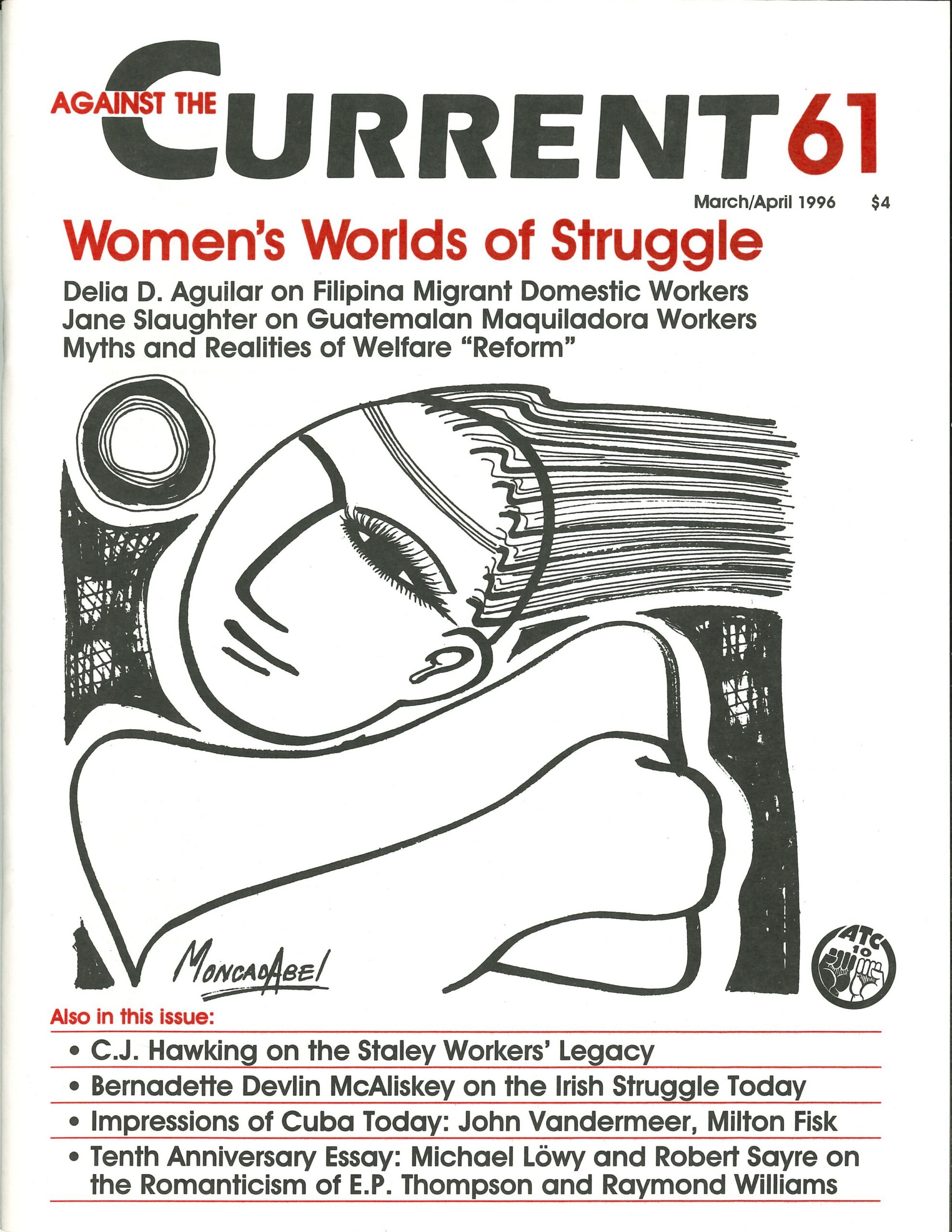Against the Current, No. 61, March/April 1996
-
NATO's Squalid Police Action
— The Editors -
Staley's Legacy of Struggle, Lessons of Defeat
— C.J. Hawking -
Detroit Newspaper Strike: A Bitter Winter
— David Finkel -
In France, A Glimpse of Labor's Power
— Mia Butzbaugh -
Reflecting on the Cuban Revolution
— John Vandermeer -
Cuba: The Party, the Market
— Milton Fisk -
An Irish Revolutionary's Challenge
— Peter Downs -
Democracy or Hibernianism?
— Bernadette Devlin McAliskey -
Structures of Discrimination
— an interview with Bernadette Devlin McAliskey - The MacBride Principles
-
Why the Ceasefire Ended
— Jim Dee -
Romanticism in the English Social Sciences: E.P. Thompson & Raymond Williams
— Michael Löwy and Robert Sayre -
Radical Rhythms: The Relevance of Rap
— Tyrone Williams -
The Rebel Girl: Blowing the Whistle on Sexism
— Catherine Sameh -
Random Shots: Kampfer's Modest Suggestions
— R.F. Kampfer - A Symposium on Imperialism Today
-
On Imperialism
— The Editors -
Imperialism and the Left
— Catherine Samary -
The Empire and Left Illusions
— Thomas Harrison - For International Women's Day
-
Servants to the Global Masters
— Delia D. Aguilar -
Guatemalan Women's New World of Struggle
— Jane Slaughter -
Main Courts, Not Just Desserts
— Jane Slaughter -
A Unionist's Life
— Jane Slaughter -
Michigan's "Welfare Reform"
— an interview with Kathleen Gmeiner -
Fighting for Our Families' Lives
— an interview with Sylvia Mitchell -
Welfare Reform, Then and Now
— Amy Hanauer - Dialogue
-
A Radical Alternative in 1996
— Eric Chester - In Memoriam
-
Christopher Columbus Alston: Organizer, Fighter and Historian
— Robin D.G. Kelley -
Alma Strowiss, Organizer-Activist
— Andrea Houtman
Peter Downs
BERNADETTE DEVLIN McALISKEY, known internationally as the leading civil rights activist in Northern Ireland for the last twenty-five years, conducted a ten-city U.S. tour last October.
Born in Cookstown, County Tyrone in 1947, McAliskey emerged in 1968 as a leader of the Civil Rights Campaign. In April, 1969, she was elected to British Parliament. Four months later she was sentenced to six months in prison for helping to defend Derry’s Bogside neighborhood against a three-day assault by the Royal Ulster Constabulary and B-Special Auxiliaries.
Bernadette was a key organizer of Nationalist resistance to internment without trial between 1971 and 1975. She was a prominent member of the National H-Block/Armagh Committee which campaigned on behalf of Irish political prisoners in English jails during the Blanket Protest and later hunger strikes.
In 1981, a Loyalist death squad broke into the McAliskey home and attempted to assassinate Bernadette, her husband, and their children. Bernadette took nine bullets while shielding her infant son.
A long-time Nationalist and a defender of the IRA, Bernadette also maintained an independent socialist political perspective and a critique of reliance on narrow tactics of armed insurgency. From 1985, she began devoting her efforts to the MacBride Principles Campaign against foreign investors in Northern Ireland. Those efforts would eventually lead to the founding of Equality in 1991.
Oliver Kearney, a comrade in Equality, summarizes the differences between the agendas of the insurrection and the civil rights movement in two paragraphs of his book <MI>Equality: the Road from `68:
“The abandonment of the Civil Rights struggle by co-opted Catholic professionals,” Kearney writes, “who had called their working class brothers and sisters `to arms,’ merely guaranteed the prolongation of the conflict and the continued exclusion of the nationalist working class community from Equality within the state. The processes of co-option were predicated on the premise that the State of Northern Ireland could survive, and that all the military, political, judicial and economic resources of the British State would be devoted to ensuring its survival, under the cloak of `Parliamentary Democracy.'”
Quoting a report by the Sunday Times Insight Team from 1971, Kearney argues that in reality “the Northern Ireland state was historically vitiated, and . . . non-viable . . . ‘Since Protestant supremacy was the reason why the State was there at all . . . Dismantle the apparatus of Protestant supremacy, and you have destroyed Northern Ireland’s only justification for being a State on its own. It might just as well not exist.’
“In three or four sentences, the Insight team summarized the significance, for the very existence of the Northern Ireland State, of an agenda for Social Equality espoused by a Civil Rights Movement.”
Since the ceasefire in 1994, Bernadette has been a vocal critic of Sinn Fein’s strategy for negotiating with the British. She currently sits on the National Executive of the Irish National Congress. The following is extracted from her October 13th speech in St. Louis, Missouri.
ATC 61, March-April 1996

